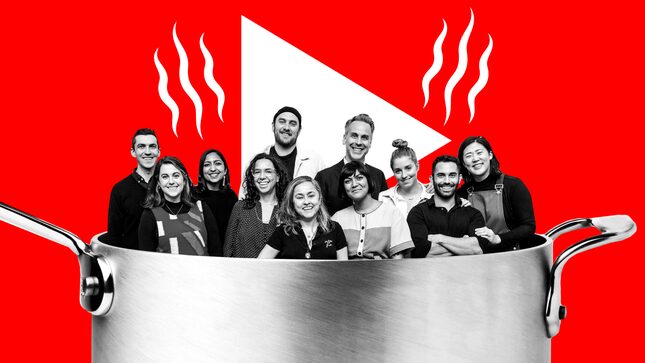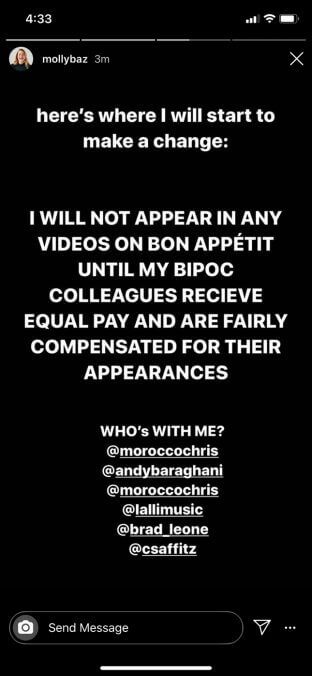
Illustration: Elena Scotti (Photos: Getty Images, Shutterstock)
For many fans of Bon Appétit’s wildly popular Youtube channel, its bustling kitchen filled with bickering and highly collaborative chefs and editors can feel like a food utopia: junk food is turned into gourmet delicacies, carbonara pasta is experimented with, and Snoop Dogg recipes are reverse-engineered via smell and taste alone. It’s great television that feels uniquely intimate, giving viewers the sense that they’re getting a glimpse of the inner workings of Bon Appétit magazine’s recipe development. But the intimacy belies turmoil that’s plagued the prestigious magazine, including allegations of racism from high-profile employees.
These criticisms, which describe a flawed institution that tokenized its biggest stars, culminated on Monday evening when Adam Rapoport resigned from his position as BA’s Editor-in-Chief. “They all deserve better,” he wrote on Instagram. “I am deeply sorry for my failings and to the position in which I put the editors of BA.” Rapoport’s resignation came after a photo of him in brownface circulated online Monday. Food writer Tammie Teclemariam resurfaced the photograph, writing, “I do not know why Adam Rapoport simply doesn’t write about Puerto Rican food for @bonAppétit himself!!!”
Prior to Rapoport’s resignation, on Monday afternoon, over 40 Bon Appetit staffers convened in a Zoom meeting, just one of many throughout the day, during which Rapoport attempted to apologize for the photo, saying it was in bad taste. He opened up the floor for staffers to speak and Sohla El-Waylly, an assistant food editor at BA and a recent but frequent presence in the brand’s videos, called explicitly for Rapoport to resign.
“I was just really angry because I was like I thought the point of the Zoom was that he was going to resign,” El-Waylly tells Jezebel. “I know that Adam is the head, but it’s everybody’s problem.”
Teclemariam’s tweet was, in part, in response to Puerto Rican food columnist Illyanna Maisonet’s publicization of a series of messages she exchanged with Rapoport criticizing BA for its Eurocentric recipes, after trying to pitch a story on Afro-Boricuas and rice fritters. “What’s accessible = what’s comfortable,” Maisonet wrote, as Rapoport seemed to dodge her criticisms of BA’s food content while giving advice on how to better freelance pieces for the publication.
The photo and DMs with Maisonet underscored a problem with BA’s increasingly popular Youtube channel which the brand has failed to rectify for years now: the whiteness of its staff and on-camera personalities, a longtime problem that has become viscerally apparent as its video following has grown. And as the photo of Rapoport began to go viral on Monday, former and current staffers of color began sharing their experiences at BA on social media.
“I left BA for multiple reasons, but one of the main reasons was that white leadership refused to make changes that my BIPOC coworkers and I constantly pushed for,” Alex Lau, a former staff photographer, wrote on Twitter in a thread about the magazine’s failure to include food voices beyond white and Asian chefs. “My whole point for being at this brand has been to uplift and celebrate the work of BIPOC and Queer folx,” Jesse Sparks, an editorial assistant, wrote. “I’ve put up with a lot of shit because it was more important to me that I could help other people get the recognition they deserved.”
The Monday meeting was one of the few times that the BA staff had gathered together since New York City shut down amid the coronavirus pandemic. A senior staffer at the magazine told Jezebel that in recent weeks, everyone has been on their own “island,” many “fighting for their lives” to keep up with the workload. One staffer said that BA, regardless of the on-screen camaraderie, is a deeply divided workplace. Others echoed that sentiment. By the very nature of their already confusing contracts with Condé Nast, which divides employees into two separate but interacting arms of the company, some work for BA’s editorial wing while others work for Condé Nast Entertainment (CNE). That division is important to understanding the pay disparities among BA’s onscreen talent.
-

-

-

-

-

-

-

-

-

-

-

-

-

-

-

-

-

-

-

-

-

-

-

-

-

-

-

-

-

-

-

-

-

-

-

-

-

-

-

-









































